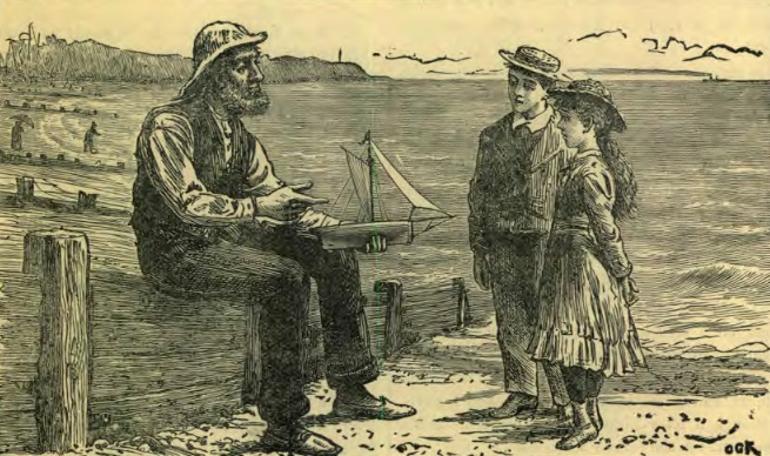
STORY OF THE SEA.
‘T was a sunny June that morning. Inland you would have said the weather was hot, but here by the Atlantic the cool sea-breeze made you forget all about the sun. This morning Carine and her brother Jo were walking slowly down the beach, filling the pockets of their neat sailor suits with bright pebbles that the waves had washed far up onto the beach. Every now and then a wave larger than the rest would come in with a rush and a roar, wetting the sand where they stood, and rattling the pebbles down again back to the ocean's rocky bed.
”I say, Carine," said Jo, when he had filled all his pockets with his ocean treasures, "let's go back to the cottage, and get my sail-boat. You know I broke the mast the other day. We'll go down and get Jack to mend it."
"All right!" said Carine. And away they both ran across the smooth, hard, white sand that scarcely left a trace of their footprints.
This was their first summer at the seaside. Their father had rented the pretty little cottage up on the cliff, and they had come to live by the ocean through all the hot weather. When they had found their boat, and had told their mother where they were going, they set out for Jack's house. Jack was an old sailor who lived near the other end of the beach. His cottage stood at the foot of some high cliffs that rose up along the edge of the shore for a mile or more.
This morning they hunted all around the dwelling for the old fisherman, but could not find him. Then they walked farther down the beach, coming suddenly upon him while he was quietly mending his nets.
"Keep off there," cried Jack, as Carine's boot heel caught in the meshes of the net; "you're a little bigger fish than I care to catch." The children laughed; and when Jack had finished his work, Jo said, "I broke the mast to my boat the other day; so we fetched it to you to see if you wouldn't mend it for us."
"Just like a boy," growled the skipper, as he looked the boat over; "always breakin' things the first time he touches 'em." But Jo didn't mind Jack's gruff ways; he knew that behind it all he carried a kind heart.
"Please, Jack," said Jo, as the old man started toward the house, "won't you tell us a story this morning? We're tired of almost everything else."
"Well," said Jack, "I haven't very much time for anything but a short one. What'll it be about?"
"A shipwreck," said Jo.
"I'll tell ye one I can remember about. Do ye see," said the skipper, pointing seaward, and, as he spoke, sitting down on a sort of fence built to keep the waves from washing too far up on the land —"do ye see that bit of a speck way out on the ocean rim under that big cloud?" The children scanned the horizon earnestly, and at length Carine said, "I see it. It looks like an island, with a lighthouse on it."
"So it is," said the skipper. "It's 'bout nine mile from here, and 'round there's the best fishin' grounds in these parts. Many's the fish I've caught in its deep waters.
"Well, 'bout ten years ago, on just such another mornin' as this, I remember; a large boat-load of our young folk sailed out to the island to fish. One o' my old neighbors took 'em out in his boat, as worthy a little craft as ever sailed these parts, every bit.
"You'd a hardly believed it in the mornin',
‘t was so sunshiny and nice; but long a little in the afternoon, when it was hot and still, and you could hardly get a breath, a sudden squall came up. We saw it a comin', and run down to the beach to watch for the boat to come in. Through the glass we could see 'em making their best for home. The lightning glared, and the thunder rolled, and then the rain came pouring slantwise down, till we couldn't see 'em anymore." "Why didn't they go on the island?" asked Carine. "'T warn't no use. The rocks just jump right off into the sea, and no live boat could a landed there in a storm. Much as ever we can make it over the rocks in fair weather. They had a long home run." "Didn't they get here all safe?" asked Carine, breathlessly. "Yonder's their graves up on the hill," he replied, and the children's eyes followed the motion of his hand, as he pointed to the tombstones glistening cold and white in the morning sun. "We'd a done anything we could to a helped 'em," continued Jack, "but't would a been madness to put to sea in such a squall. In the mornin' they lay washed up here dead and white on this very beach. 'T were the biggest funeral, with the most mourners, as ever went into our little church." "I must go now," said he, rising to his feet.. "I'll mend the boat tonight, and if you come up for her tomorrow mornin', you can have her in good trim." "But remember, lad," he added, as he turned to depart, "we're all sailors on a sea that's a good deal more dangerous than this one tumblin' in at our feet. I mean the sea of life," he said, as he saw the puzzled look on Jo's face. "Don't trust overmuch to the way things look. I've seen many a fine fellow make shipwreck in this sea, because he put too much faith in fair winds and smooth seas. 'T ain't safe."
W. E. L.